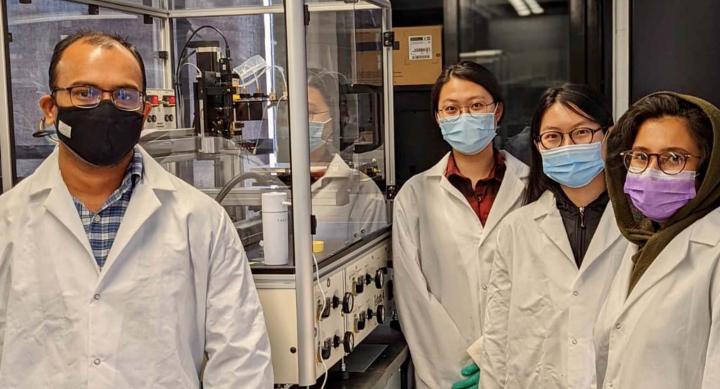
Some members of the IUD project team: Dr. Jaidev Chakka, Anqi Lu, Jiawei Wang and Dr. Niloofar Heshmati.
The University of Texas at Austin College of Pharmacy’s Pharmaceutical Engineering and 3D Printing Labs, led by Dr. Mo Maniruzzaman, have received a federal grant from the United States Agency for International Development (USAID) to develop personalized 3D printed non-hormonal intrauterine devices (IUDs). The project’s goal is to increase global access to long-term and effective contraception while minimizing some of its most debilitating side effects.
The project is in collaboration with Contraceptive Research and Development (CONRAD), a leading scientific research organization that works to improve the reproductive health of women. The organization was established under a cooperative agreement with Eastern Virginia Medical School (EVMS) and USAID.
IUDs are one of the most highly effective contraceptives available and offer higher continual use rates compared to other forms of contraception. Copper-releasing IUD devices such as ParaGard are the only non-hormonal IUDs available in the United States. The mechanism of action for these marketed copper-based IUDs is primarily related to the impact of copper ions on sperm motility and viability. Additionally, the resultant changes on cervical mucus and the accumulation of polymorphonuclear lymphocyte to the uterus helps maintain the efficacy of this device.
While commercial IUDs typically do not change menstrual frequency, they often increase menstrual flow and cramping, accounting for approximately 10-13% of users having their IUDs removed within the first year of use.
To overcome some of these drawbacks, the Maniruzzaman Lab plans to produce personalized IUDs by means of an optimized 3D printing process developed in PharmE3D Labs.
The United States Agency for International Development (USAID) is an independent agency of the United States federal government that is primarily responsible for administering civilian foreign aid and development assistance. USAID is one of the largest official aid agencies in the world and accounts for more than half of all U.S. foreign assistance—the highest in the world in absolute dollar terms.
“This USAID grant has potential to make a significant impact on women’s reproductive health in the developing world,” says Maniruzzaman, an assistant professor in the college’s Division of Molecular Pharmaceutics and Drug Delivery. “Our collaboration with CONRAD and EVMS has been fruitful at the further development of 3D printing technologies to tackle global health issues and healthcare access.”

